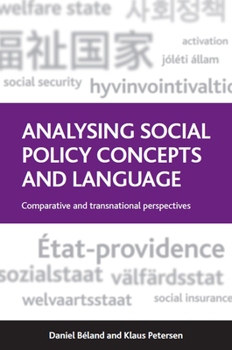Analysing Social Policy Concepts and Language: Comparative and Transnational Perspectives
Select Format
Select Condition 
Book Overview
Social policy scholars and practitioners work with concepts such as "welfare state" and "social security" but where do these concepts come from and how has their meaning changed over time? Which are the dominant social policy concepts and how are they contested? What characterises social policy language in specific countries and regions of the world and how do social concepts travel between countries?
Addressing such questions in a systematic manner for the first time, this edited collection, written by a cross-disciplinary group of leading social policy researchers, analyses the concepts and language used to make sense of contemporary social policy. The volume focuses on OECD countries located on four different continents: Asia, Australasia, Europe, and North America. Combining detailed chapters on particular countries with broader comparative chapters, the book strikes a rare balance between case studies and transnational perspectives. It will be of interest to academics and students in social policy, social work, political science, sociology, history, and public administration, as well as practitioners and policy makers.





